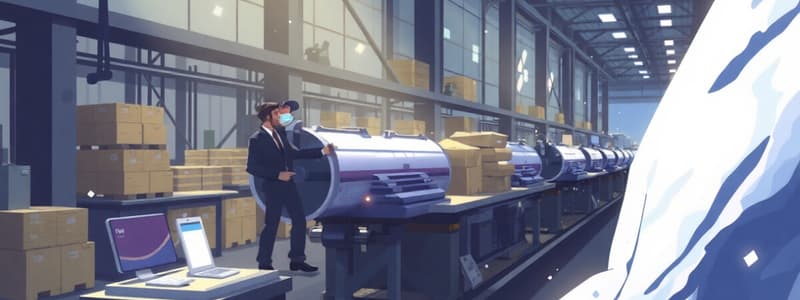Podcast
Questions and Answers
What are the three objectives of a production management system in ERP?
What are the three objectives of a production management system in ERP?
The objectives include creating a production plan, acquiring raw materials, and scheduling equipment, facilities, and human resources.
What are the primary functions of a materials management system?
What are the primary functions of a materials management system?
A materials management system focuses on identifying and tracking the stock needed, calculating lead times, determining safety stock levels, assigning cost-effective purchase orders, and producing accurate orders.
What is the role of the Master Production Schedule (MPS) in material resource planning?
What is the role of the Master Production Schedule (MPS) in material resource planning?
- The MPS determines the production capacity for each manufacturing facility.
- The MPS provides a detailed list of all raw materials required for production.
- The MPS helps manage the allocation of human resources for production tasks.
- The MPS uses sales forecasts to identify products needed and is the core data for MRP. (correct)
What are the benefits of Just-in-Time (JIT) systems in production and manufacturing?
What are the benefits of Just-in-Time (JIT) systems in production and manufacturing?
Capacity planning primarily focuses on managing the allocation of production capacity.
Capacity planning primarily focuses on managing the allocation of production capacity.
Which of the following is NOT a benefit of integrating production and materials management modules in ERP?
Which of the following is NOT a benefit of integrating production and materials management modules in ERP?
Explain how ERP systems handle RFPS more efficiently.
Explain how ERP systems handle RFPS more efficiently.
Flashcards
ERP Production Management
ERP Production Management
A system within ERP that manages the entire production process, including planning, acquiring materials, scheduling facilities and labor, designing products, and maintaining quality.
Materials Management
Materials Management
A system within ERP that handles the acquisition, storage, and distribution of materials needed for production. It ensures the right materials are available at the right time.
Traditional Production Systems
Traditional Production Systems
Earlier methods of production that lacked integration between various departments within a company, creating inefficiencies and delays.
Lack of Integration
Lack of Integration
Signup and view all the flashcards
Material Resource Planning (MRP)
Material Resource Planning (MRP)
Signup and view all the flashcards
Just-in-Time Production (JIT)
Just-in-Time Production (JIT)
Signup and view all the flashcards
Capacity Planning
Capacity Planning
Signup and view all the flashcards
Manufacturing Execution Systems (MES)
Manufacturing Execution Systems (MES)
Signup and view all the flashcards
Activity-Based Costing (ABC)
Activity-Based Costing (ABC)
Signup and view all the flashcards
eBusiness Strategies
eBusiness Strategies
Signup and view all the flashcards
Study Notes
ERP Systems: Production and Materials Management
- ERP systems integrate production and materials management
- Objectives include examining production and materials management systems in ERP
- Interrelationships among business processes supporting production and materials management are important
- Atlantic Manufacturing case study shows problems: inconsistent raw materials/finished goods levels; late change specifications; long lead times; poor information from other divisions; lost purchase requisitions
- Manufacturing systems background: re-order point system; increased flexibility, responsiveness, and integration; high-volume production of few products (1960s-1980s); mainframe-based databases; production of new products to meet customer needs (late 1980s); flexible manufacturing execution systems; integration of processes/data for operational efficiency; ERP systems integrated supply chains.
- Problems with traditional production systems include lack of integration across divisions; inaccurate forecasts leading to incorrect purchasing decisions resulting in shortages or excess raw materials/finished products; excess inventories impacting cash flow/profitability.
- Production system objectives: develop production plans; acquire raw materials; schedule equipment/facilities/human resources; design products; produce appropriate quantities and quality levels.
- Operational-level processes: daily activities, purchasing (acquiring raw materials/supplies), receiving (inspection of deliveries), quality control (monitoring acceptability), and inventory management (maintaining appropriate inventory levels).
- Information systems support production planning/manufacturing processes via data collection systems, material management systems, BOM systems, inventory management systems, and cost accounting systems.
- Material resource planning (MRP) processes: identifying stock needed; calculating lead time; determining safety stock levels; assigning optimal order quantities; and producing accurate purchase orders. MRP takes inputs from the master production schedule (MPS). MPS uses sales forecasts to determine needed products.
- MRP Vocabulary: definitions of MRP, Bill of Materials (BOM), lead times, lot sizing, master production schedule (MPS), gross requirements, and planned orders.
- Just-in-Time (JIT) Systems: goal is to only maintain the necessary inventory levels; requires supplies to be delivered only as needed; uses EDI or Internet for orders and continuous replenishments of raw materials; reduces storage costs; and improves supply chain/value chain management.
- Capacity planning evaluates production capacity against production goals; requires specific information; creates time-phased plans for products/production areas; allocates specific facilities; estimates human resource needs; integrates product design/development with cost information allowing comparison of alternatives; to decrease expenses
- ERP production planning and materials management modules: extend information distribution, support materials requirement planning/inventory management/capacity planning, merge multiple databases, eliminate paperwork/bottlenecks, decrease design costs/lead times/personnel costs, increase productivity, use sales forecasts to develop production plans, create MPS from demand management, determine quantities/dates for finished products, create efficient material plans, determine order timing, create work orders sent to production, integrate ERP systems.
- Materials management modules: Factory floor information and communication systems (MES) that provide feedback on a real-time basis. Production scheduling is combined with front-end and back-end applications. Business analysis and support systems (APS) leverage data for decision support and data collection using real-time data from mobile phones or Internet-enabled devices (automated data collection).
- eBusiness Strategies: facilitates communication along the supply chain; B2B (many suppliers are available & Internet enables quick/easy exchange of information); eMarketplaces allow aggregation of buyers to improve purchasing power; reduces costs. eBusiness Strategies eliminate traditional supply chains/problems & handle requests for proposal (RFPs) more efficiently.
- Featured Article: What ERP Can Offer ABC: examines manufacturing data used in managerial accounting module; usage of this info in controlling costs/maximizing productivity/streamlining operations; data integration to support managerial decision making. In ABC systems, activity-based costing systems need correct activity cost drivers, non-financial measurements are difficult to find in financial accounting systems, lack process controls/often derived from "back of an envelope" information. ERP systems and activity cost-driver information increase availability/reliability and allow multiple systems integration. SAP's R/3 system links production planning and materials management; establishes standards for materials handling which uses activity cost driver ("number of pallet moves"). Direct costs can be calculated instead of being considered overhead; Bill of Services created. Activity-based budgeting anticipates demand for process, estimates practical capacity, estimates quantity of direct materials/costs, and can improve processes/determine adjustments. Non-financial measures are collected for drivers; this process includes formal processes, built-in controls for reliability, and high degree of integrity.
- Summary of traditional production systems: lack integration, poor planning coordination with organization's manufacturing operations, particularly at the operational level. Organizations want material resource planning (MRP), JIT systems, and capacity planning; ERP systems offer both production planning and materials management, facilitate communications along the supply chain, and improve e-business opportunities.
Studying That Suits You
Use AI to generate personalized quizzes and flashcards to suit your learning preferences.
Related Documents
Description
This quiz explores the integration of ERP systems in production and materials management. It delves into the interrelationships of business processes and highlights challenges faced in the Atlantic Manufacturing case study. Understand the evolution of manufacturing systems and the importance of integrated supply chains.




